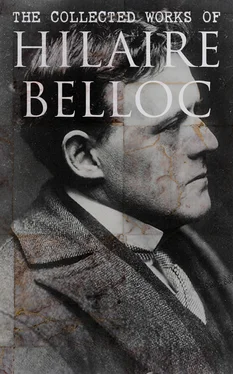'Sire!' cried St Michael, in a voice that shook the architraves of heaven, 'they are worshipping You!'
'Oh! they are worshipping me! Well, that is the most sensible thing I have heard of them yet, and I altogether commend them. 'Continuez,' said the Padre Eterno, 'continuez!'
And since then all has been well with the world; at least where Us continuent .
And so, carissimi, multitudes, all of you good-bye; the day has long dawned on the Via Cassia, this dense mist has risen, the city is before me, and I am on the threshold of a great experience; I would rather be alone. Good-bye my readers; good-bye the world.
At the foot of the hill I prepared to enter the city, and I lifted up my heart.
There was an open space; a tramway: a tram upon it about to be drawn by two lean and tired horses whom in the heat many flies disturbed. There was dust on everything around.
A bridge was immediately in front. It was adorned with statues in soft stone, half-eaten away, but still gesticulating in corruption, after the manner of the seventeenth century. Beneath the bridge there tumbled and swelled and ran fast a great confusion of yellow water: it was the Tiber. Far on the right were white barracks of huge and of hideous appearance; over these the Dome of St Peter's rose and looked like something newly built. It was of a delicate blue, but made a metallic contrast against the sky.
Then (along a road perfectly straight and bounded by factories, mean houses and distempered walls: a road littered with many scraps of paper, bones, dirt, and refuse) I went on for several hundred yards, having the old wall of Rome before me all this time, till I came right under it at last; and with the hesitation that befits all great actions I entered, putting the right foot first lest I should bring further misfortune upon that capital of all our fortunes.
And so the journey ended.
It was the Gate of the Poplar--not of the People. (Ho, Pedant! Did you think I missed you, hiding and lurking there?) Many churches were to hand; I took the most immediate, which stood just within the wall and was called Our Lady of the People--(not 'of the Poplar'. Another fall for the learned! Professor, things go ill with you to-day!). Inside were many fine pictures, not in the niminy-piminy manner, but strong, full-coloured, and just.
To my chagrin, Mass was ending. I approached a priest and said to him:
'Pater, quando vel a quella hora e la prossimma Missa?'
'Ad nonas,' said he.
'Pol! Hercle!' (thought I), 'I have yet twenty minutes to wait! Well, as a pilgrimage cannot be said to be over till the first Mass is heard in Rome, I have twenty minutes to add to my book.'
So, passing an Egyptian obelisk which the great Augustus had nobly dedicated to the Sun, I entered....
LECTOR. But do you intend to tell us nothing of Rome?
AUCTOR. Nothing, dear Lector.
LECTOR. Tell me at least one thing; did you see the Coliseum?
AUCTOR. ... I entered a cafe at the right hand of a very long, straight street, called for bread, coffee, and brandy, and contemplating my books and worshipping my staff that had been friends of mine so long, and friends like all true friends inanimate, I spent the few minutes remaining to my happy, common, unshriven, exterior, and natural life, in writing down this
LOUD AND FINAL SONG
DITHYRAMBIC EPITHALAMIUM OR THRENODY
In these boots, and with this staff
Two hundred leaguers and a half--
(That means, two and a half hundred leagues. You follow? Not two hundred and one half league.... Well--)
Two hundred leaguers and a half
Walked I, went I, paced I, tripped I,
Marched I, held I, skelped I, slipped I,
Pushed I, panted, swung and dashed I;
Picked I, forded, swam and splashed I,
Strolled I, climbed I, crawled and scrambled,
Dropped and dipped I, ranged and rambled;
Plodded I, hobbled I, trudged and tramped I,
And in lonely spinnies camped I,
And in haunted pinewoods slept I,
Lingered, loitered, limped and crept I,
Clambered, halted, stepped and leapt I;
Slowly sauntered, roundly strode I,
And ... (Oh! Patron saints and Angels
That protect the four evangels!
And you Prophets vel majores
Vel incerti, vel minores,
Virgines ac confessores
Chief of whose peculiar glories
Est in Aula Regis stare
Atque orare et exorare
Et clamare et conclamare
Clamantes cum clamoribus
Pro nobis peccatoribus.)
Let me not conceal it... Rode I.
(For who but critics could complain
Of 'riding' in a railway train?)
Across the valleys and the high-land,
With all the world on either hand.
Drinking when I had a mind to,
Singing when I felt inclined to;
Nor ever turned my face to home
Till I had slaked my heart at Rome.
THE END AGAIN
LECTOR. But this is dogg--
AUCTOR. Not a word!
FINIS
1.But if one does one is a fool.
Table of Contents
Table of Contents
On the Road and the Fascination of Antiquity
The Theory of the Old Road
The Exploration of the Road
ON THE ROAD AND THE
FASCINATION OF ANTIQUITY
Table of Contents
There are primal things which move us. Fire has the character of a free companion that has travelled with us from the first exile; only to see a fire, whether he need it or no, comforts every man. Again, to hear two voices outside at night after a silence, even in crowded cities, transforms the mind. A Roof also, large and mothering, satisfies us here in the north much more than modern necessity can explain; so we built in beginning: the only way to carry off our rains and to bear the weight of our winter snows. A Tower far off arrests a man's eye always: it is more than a break in the sky-line; it is an enemy's watch or the rallying of a defence to whose aid we are summoned. Nor are these emotions a memory or a reversion only as one crude theory might pretend; we craved these things—the camp, the refuge, the sentinels in the dark, the hearth—before we made them; they are part of our human manner, and when this civilisation has perished they will reappear.
Of these primal things the least obvious but the most important is The Road. It does not strike the sense as do those others I have mentioned; we are slow to feel its influence. We take it so much for granted that its original meaning escapes us. Men, indeed, whose pleasure it is perpetually to explore even their own country on foot, and to whom its every phase of climate is delightful, receive, somewhat tardily, the spirit of The Road. They feel a meaning in it; it grows to suggest the towns upon it, it explains its own vagaries, and it gives a unity to all that has arisen along its way. But for the mass The Road is silent; it is the humblest and the most subtle, but, as I have said, the greatest and the most original of the spells which we inherit from the earliest pioneers of our race. It was the most imperative and the first of our necessities. It is older than building and than wells; before we were quite men we knew it, for the animals still have it to-day; they seek their food and their drinking-places, and, as I believe, their assemblies, by known tracks which they have made.
It is easy to re-create in oneself to-day a sense of what the Road means to living things on land: it is easy to do it even in this crowded country. Walk, for instance, on the neglected Pennines along the watershed of England, from Malham Tarn, say, to Ribblehead, or from Kirkby Stephen up along the crest to Crossfell and so to Alston, and you will learn at once what follows on an untouched soil from the absence of a track—of a guide. One ravine out of the many radiating from a summit will lead to the one valley you seek; take another stream and you are condemned at last to traverse mountains to repair the error. In a fog or at night, if one has not such a path, there is nothing to help one but the lay of the snow or the trend of the vegetation under the last gale. In climbing, the summit is nearly always hidden, and nothing but a track will save you from false journeys. In descent it alone will save you a precipice or an unfordable stream. It knows upon which side an obstacle can be passed, where there is firm land in a morass, and where there is the best going; sand or rock—dry soil. It will find what nothing but long experiment can find for an individual traveller, the precise point in a saddle or neck where approach is easiest from either side, and everywhere the Road, especially the very early Road, is wiser than it seems to be. It reminds one of those old farmers who do not read, and whom we think at first unreasoning in their curious and devious ways, but whom, if we watch closely, we shall find doing all their work just in that way which infinite time has taught the country-side.
Читать дальше












